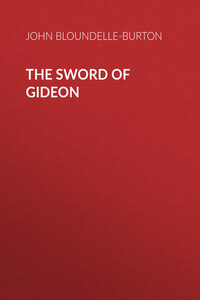CHAPTER I
"YOU WILL FORGIVE?"
A young man, good-looking, with well-cut features, and possessing a pair of clear blue-grey eyes, sat in a first-class smoking compartment of a train standing in Waterloo Station-a train that, because there was one of those weekly race-meetings going on farther down the line, which take place all through the year, gave no sign of ever setting forth upon its journey. Perhaps it was natural that it should not do so, since, as the dwellers on the southern banks of the Thames are well aware, the special trains for the frequenters of race-courses take precedence of all other travellers; yet, notwithstanding that such is the case, this young man seemed a good deal annoyed at the delay. One knows how such annoyance is testified by those subjected to that which causes it; how the watch is frequently drawn forth and consulted, the station clock glanced at both angrily and often, the officials interrogated, the cigarette flung impatiently out of the window, and so forth; wherefore no further description of the symptoms is needed.
All things, however, come to an end at last, and this young man's impatience was finally appeased by the fact of the train in which he sat moving forward heavily, after another ten minutes' delay; and also by the fact that, after many delays and stoppages, it eventually passed through Vauxhall and gradually, at a break-neck speed of about ten miles an hour, forced its way on towards the country.
"Thank goodness!" exclaimed Julian Ritherdon, "thank goodness! At last there is a chance that I may see the dear old governor before night falls. Yet, what on earth is it that I am to be told when I do see him-what on earth does his mysterious letter mean?" And, as he had done half a dozen times since the waiter had brought the "mysterious letter" to the room in the huge caravansary where he had slept overnight, he put his hand in the breast pocket of his coat and, drawing it forth, began another perusal of the document.
Yet his face clouded-as it had done each time he read the letter, as it was bound to cloud on doing so! – at the first worst words it contained; words which told the reader how soon-very soon now, unless the writer was mistaken-he would no longer form one of the living human units of existence.
"Poor old governor, poor old dad!" Lieutenant Ritherdon muttered as he read those opening lines. "Poor old dad! The best father any man ever had-the very best. And now to be doomed; now-and he scarcely fifty! It is rough. By Jove, it is!"
Then again he read the letter, while by this time the train, by marvellous exertions, was making its way swiftly through all the beauty that the springtide had brought to the country lying beyond the suburban belt. Yet, just now, he saw nothing of that beauty, and failed indeed to appreciate the warmth of the May day, or to observe the fresh young green of the leaves or the brighter green of the growing corn-he saw and enjoyed nothing of all this. How should he do so, when the letter from his father appeared like a knell of doom that was being swiftly tolled with, for conclusion, hints-nay! not hints, but statements-that some strange secrets which had long lain hidden in the past must now be instantly revealed, or remain still hidden-forever?
It was not a long letter; yet it told enough, was pregnant with matter.
"If," the writer said, after the usual form of address, "your ship, the Caractacus, does not get back with the rest of the Squadron ere long, I am very much afraid we have seen the last of each other; that-and Heaven alone knows how hard it is to have to write such words! – we shall never meet again in this world. And this, Julian, would make my death more terrible than I can bear to contemplate. My boy, I pray nightly, hourly, that you may soon come home. I saw the specialist again yesterday and he said-Well! no matter what he said. Only, only-time is precious now; there is very little more of it in this world for me."
Julian Ritherdon gazed out of the open window as he came to these words, still seeing nothing that his eyes rested on, observing neither swift flowering pink nor white may, nor budding chestnut, nor laburnum bursting into bloom, nor hearing the larks singing high up above the cornfields-thinking only again and again: "It is hard. Hard! Hard! To die now-and he not fifty!"
"And I have so much to tell you," he read on, "so much to-let me say it at once-confess. Oh! Julian, in my earlier days I committed a monstrous iniquity-a sin that, if it were not for our love for each other-thank God, there has always been that between us! – nothing can deprive the past of that! – would make my ending even worse than it must be. Now it must be told to you. It must. Already, because I begin to fear that your ship may be detained, I have commenced to write down the error, the crime of my life-yet-yet-I would sooner tell it to you face to face, with you sitting before me. Because I do not think, I cannot think that, when you recall how I have always loved you, done my best for you, you will judge me hardly, nor-"














